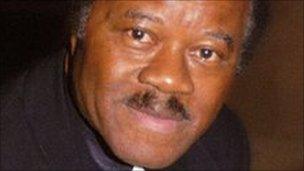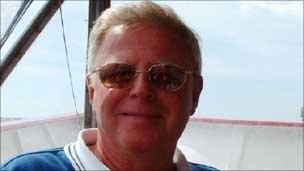Patient's death leads to tougher European safety call
- Published
Patients in the UK needing out of hours care are to get more protection from incompetent doctors following a deal being brokered across Europe.
Rules allowing doctors to work anywhere in Europe are to be toughened with better testing of language and competency.
The General Medical Council (GMC) in the UK has so far secured the backing of regulators in 26 European Union countries for tighter controls on doctors working across borders.
It follows nearly three years of campaigning by Dr Stuart Gray and his brother Rory whose father David was killed by an incompetent GP who had flown in from Germany to do a shift.
That doctor, Daniel Ubani, is still treating patients in Germany, despite being struck off by the GMC and branded "incompetent" for killing their kidney patient father David with a lethal overdose of Diamorphine.
Until now, foreign doctors banned in one country have been free to practise in other countries.
Niall Dickson, chief executive of the GMC, said tighter controls on foreign doctors were attributable in "no small part" to the efforts of the Gray brothers.
He said: "I am really quite pleased that we have made some significant progress.

Dr Daniel Ubani remains free to practise medicine in Germany
"There is recognition now by the UK Government that they need to change UK law and that they need to make significant progress in Europe.
"We have got 26 European regulators saying something needs to be done about language and information."
He added: "There is still a feeling among many in Europe that this is about free movement of labour.
"Free movement of labour is a good thing and I am not going to start arguing about that, but what I do say is that patient safety must trump movement of labour and patient safety."
Dr Stuart Gray, a GP in the West Midlands, is also campaigning with his brother for a Europe-wide ban on any doctor struck off in one country.
'Local doctors'
In a BBC1 documentary "Killer on Call" to be broadcast on BBC1 East at 1930 GMT, Dr Gray inspected the new out-of-hours service in Cambridgeshire - the county in which his father was killed.
He said: "They seem to have made tremendous efforts to get the system patient-centred and it seemed to be a centre of excellent practise.
"It is extremely important for patient care that local doctors are carrying out the out-of-hours service."
The company which employed Dr Ubani, Take Care Now (TCN), has been taken over by another provider, Harmoni.
Harmoni's Chief Executive Andrew Gardner told the programme: "I am very confident of all of the things we have put in place that the people in the East of England will get a good service, a high quality service, a safe service."

David Gray was injected with 10 times the safe dose of diamorphine
Mr Gardner has defended Harmoni's decision to retain many of the senior managers who worked at the former company TCN.
He said: "The two people who are responsible for this service, the clinical manager and the general manager, are new employees.
"The other employees are people we think under the right culture, the right regime and ethos, can deliver a highly valuable service."
A national helpline run by the Patients Association still receives regular complaints about out of hours care.
Its chief executive, Katherine Murphy, told the BBC she was concerned about discrepancies in the cost of out-of-hours care facing many Primary Care Trusts in the UK.
She said: "It's absolutely amazing that some PCTs can be paying as much as 16 times more than another PCT.
"I would hope that the David Gray case is a wake-up call for all Primary Care Trusts."
"Killer On Call" can be seen on BBC1 East on 10 December at 1930 GMT.
- Published10 December 2010
- Published3 September 2010
- Published25 August 2010